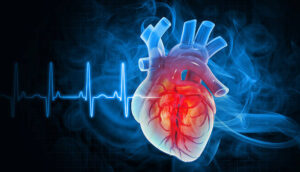When Michael, a 45-year-old father of two, felt a sharp pain in his chest during a routine morning jog, he brushed it off as indigestion. A week later, a visit to his doctor revealed early signs of coronary heart disease (CHD). “It was a wake-up call,” Michael recalls. “I realized I needed to take control of my health, not just for me, but for my family.” His story isn’t unique—heart disease remains a leading cause of death globally, but research shows that self-control can be a powerful tool in improving heart-healthy behaviors and preventing further complications.
The Science of Self-Control and Heart Health
A 2017 study published in Frontiers in Psychology found that self-control significantly improves health-promoting (HP) behaviors in patients with CHD. The research highlights that self-control indirectly enhances HP behaviors through ego-depletion, a state where mental resources are temporarily drained, affecting decision-making. The study notes, “Self-control in patients with CHD uses ego-depletion as the mediating variable to indirectly and positively predict the level of HP behavior, with mediating effects accounting for 47.76% (impulsive system) and 15.6% (control system) of the total effects”. For Michael, this meant learning to resist impulsive choices—like skipping workouts or indulging in unhealthy foods—to prioritize his heart health.
Another study from Springer emphasizes the role of self-control in managing chronic conditions, noting that “self-regulatory strategies can empower patients to adhere to lifestyle changes, reducing the risk of cardiovascular events”. These findings underscore that self-control isn’t just about willpower; it’s a skill that can be cultivated to strengthen both mind and heart.
Michael’s Transformation: Practical Steps to Heart Health
After his diagnosis, Michael committed to a heart-healthy lifestyle. Here’s how he applied self-control to improve his heart health, backed by science:
1. Adopting a Heart-Healthy Diet
Michael swapped processed snacks for nutrient-rich foods. Research from PubMed suggests that diets rich in fruits, vegetables, and whole grains can reduce arterial plaque. “I started eating more berries and nuts,” Michael says. “It wasn’t easy to say no to burgers, but I felt stronger each time I did.” Foods like blueberries, rich in antioxidants, are linked to cleaner arteries, with studies calling them a “number one food” for heart health.
2. Prioritizing Exercise
Exercise became a cornerstone of Michael’s routine. According to the American Heart Association, regular physical activity can strengthen a weak heart and improve cardiovascular function. Michael started with brisk walks and stair climbing, which a 2021 study confirms is beneficial for heart patients when done moderately. “Climbing stairs felt daunting at first,” he admits, “but it became a daily victory.”
3. Managing Stress with Self-Control
Stress can exacerbate heart issues, but self-control helps. Michael practiced mindfulness, a technique supported by research for reducing stress-induced inflammation. “I learned to pause and breathe when work got overwhelming,” he says. This aligns with biblical teachings, like Proverbs 25:28, which compares a lack of self-control to “a city broken into and left without walls.”
4. Avoiding Harmful Habits
Michael quit smoking, a habit dubbed the “#1 worst” for heart health by cardiologists. Studies show smoking accelerates arterial blockages, but quitting can reverse some damage. “It was tough,” Michael reflects, “but I prayed for strength daily.”
A Biblical Perspective on Self-Control
Self-control is not only a scientific principle but also a spiritual one. The Bible describes it as a fruit of the Spirit (Galatians 5:22-23), symbolizing discipline and faith. Jesus exemplified self-control, resisting temptation in the wilderness (Matthew 4:1-11). For Michael, applying 2 Timothy 1:7—“For God gave us a spirit not of fear but of power and love and self-control”—became a daily prayer. “It reminded me that I wasn’t alone in this fight,” he says.
Proverbs 25:28 warns against lacking self-control, and saints like St. Augustine, known for overcoming personal struggles, inspire believers to build discipline through faith. Praying for self-control, as Michael did, can involve simple pleas: “Lord, grant me the strength to choose what’s right for my body and soul.”
Practical Tips to Build Self-Control for Heart Health
- Set Small Goals: Start with manageable changes, like drinking water instead of soda. Research shows small wins build self-control.
- Practice Mindfulness: Daily meditation or prayer can reduce impulsive decisions.
- Seek Support: Join a community or church group to stay accountable.
- Use Biblical Wisdom: Reflect on scriptures like 1 Corinthians 9:27, where Paul speaks of disciplining his body.
Frequently Asked Questions
How to Improve Heart Health Quickly?
To improve heart health quickly, incorporate aerobic exercise, a Mediterranean diet, and stress management. Results can appear in weeks, per the American Heart Association.
What to Avoid for Heart Health?
For heart health, avoid smoking, excessive alcohol, and trans fats, which clog arteries.
How Can Self-Control Ensure a Healthy Life?
Self-control helps you stick to healthy habits, reducing ego-depletion’s impact on poor choices.
How Can I Check My Heart Health at Home?
To check your heart health at home, monitor pulse, blood pressure, and watch for symptoms like fatigue or chest pain. Consult a doctor for accurate assessments.
What Drink Cleans the Heart?
Green tea, rich in catechins, supports arterial health, per PubMed studies.
Can a Weak Heart Get Stronger Again?
Yes, a weak heart can get stronger again with exercise and diet, as shown in Michael’s story and supported by research.
What Are the Signs of an Unhealthy Heart?
Signs of an unhealthy heart are shortness of breath, chest pain, and irregular heartbeat, which are red flags. Seek medical advice immediately.
What Is the Number One Food to Clean Arteries?
Blueberries, packed with antioxidants, top the list.
What Are the Five Pillars of Self-Control?
The five pillars of Self-Control are: Planning, monitoring, commitment, feedback, and resilience, per psychological research.
How to Pray for Self-Control?
Pray, “Lord, guide my choices to honor my body as Your temple,” drawing from 1 Corinthians 6:19-20.
Next Steps
Making intentional choices, seeking spiritual strength, and following evidence-based strategies can take charge of their heart’s future. Start by taking our free heart Test today!
As Michael puts it, “Every healthy choice is a step toward a stronger heart—and a stronger me.”





